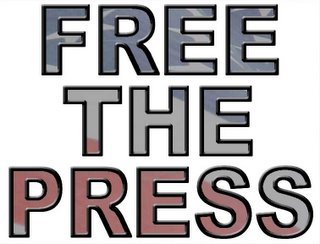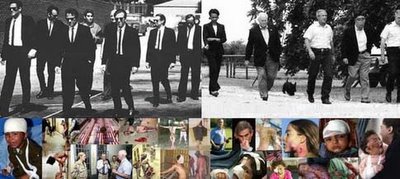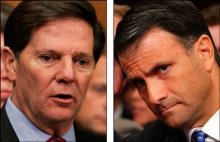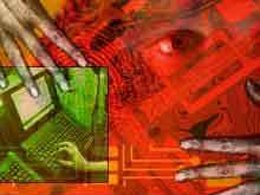
By John W. Dean
FindLaw.com
Friday 30 December 2005
Both claimed that a president may violate Congress's laws to protect national security
On Friday, December 16, the New York Times published a major scoop by James Risen and Eric Lichtblau: They reported that Bush authorized the National Security Agency (NSA) to spy on Americans without warrants, ignoring the procedures of the Foreign Intelligence Surveillance Act (FISA).
It was a long story loaded with astonishing information of lawbreaking at the White House. It reported that sometime in 2002, Bush issued an executive order authorizing NSA to track and intercept international telephone and/or email exchanges coming into, or out of, the U.S. - when one party was believed to have direct or indirect ties with al Qaeda.
Initially, Bush and the White House stonewalled, neither confirming nor denying the president had ignored the law. Bush refused to discuss it in his interview with Jim Lehrer.
Then, on Saturday, December 17, in his radio broadcast, Bush admitted that the New York Times was correct - and thus conceded he had committed an impeachable offense.
There can be no serious question that warrantless wiretapping, in violation of the law, is impeachable. After all, Nixon was charged in Article II of his bill of impeachment with illegal wiretapping for what he, too, claimed were national security reasons.
These parallel violations underscore the continuing, disturbing parallels between this Administration and the Nixon Administration - parallels I also discussed in a prior column.
Indeed, here, Bush may have outdone Nixon: Nixon's illegal surveillance was limited; Bush's, it is developing, may be extraordinarily broad in scope. First reports indicated that NSA was only monitoring foreign calls, originating either in the USA or abroad, and that no more than 500 calls were being covered at any given time. But later reports have suggested that NSA is "data mining" literally millions of calls - and has been given access by the telecommunications companies to "switching" stations through which foreign communications traffic flows.
In sum, this is big-time, Big Brother electronic surveillance.
Given the national security implications of the story, the Times said they had been sitting on it for a year. And now that it has broken, Bush has ordered a criminal investigation into the source of the leak. He suggests that those who might have felt confidence they would not be spied on, now can have no such confidence, so they may find other methods of communicating. Other than encryption and code, it is difficult to envision how.
Such a criminal investigation is rather ironic - for the leak's effect was to reveal Bush's own offense. Having been ferreted out as a criminal, Bush now will try to ferret out the leakers who revealed him.
Nixon's Wiretapping - and the Congressional Action That Followed
Through the FBI, Nixon had wiretapped five members of his national security staff, two newsmen, and a staffer at the Department of Defense. These people were targeted because Nixon's plans for dealing with Vietnam - we were at war at the time - were ending up on the front page of the New York Times.
Nixon had a plausible national security justification for the wiretaps: To stop the leaks, which had meant that not only the public, but America's enemies, were privy to its plans. But the use of the information from the wiretaps went far beyond that justification: A few juicy tidbits were used for political purposes. Accordingly, Congress believed the wiretapping, combined with the misuse of the information it had gathered, to be an impeachable offense.
Following Nixon's resignation, Senator Frank Church chaired a committee that investigated the uses and abuses of the intelligence derived from the wiretaps. From his report on electronic surveillance, emerged the proposal to create the Foreign Intelligence Surveillance Act (FISA). The Act both set limits on electronic surveillance, and created a secret court within the Department of Justice - the FISA Court - that could, within these limits, grant law enforcement's requests to engage in electronic surveillance.
The legislative history of FISA makes it very clear that Congress sought to create laws to govern the uses of warrantless wiretaps. Thus, Bush's authorization of wiretapping without any application to the FISA Court violated the law.
Whether to Allow Such Wiretaps Was Congress's Call to Make
No one questions the ends here. No one doubts another terror attack is coming; it is only a question of when. No one questions the preeminent importance of detecting and preventing such an attack.
What is at issue here, instead, is Bush's means of achieving his ends: his decision not only to bypass Congress, but to violate the law it had already established in this area.
Congress is Republican-controlled. Polling shows that a large majority of Americans are willing to give up their civil liberties to prevent another terror attack. The USA Patriot Act passed with overwhelming support. So why didn't the President simply ask Congress for the authority he thought he needed?
The answer seems to be, quite simply, that Vice President Dick Cheney has never recovered from being President Ford's chief of staff when Congress placed checks on the presidency. And Cheney wanted to make the point that he thought it was within a president's power to ignore Congress' laws relating to the exercise of executive power. Bush has gone along with all such Cheney plans.
No president before Bush has taken as aggressive a posture - the position that his powers as commander-in-chief, under Article II of the Constitution, license any action he may take in the name of national security - although Richard Nixon, my former boss, took a similar position.
Presidential Powers Regarding National Security: A Nixonian View
Nixon famously claimed, after resigning from office, that when the president undertook an action in the name of national security, even if he broke the law, it was not illegal.
Nixon's thinking (and he was learned in the law) relied on the precedent established by Abraham Lincoln during the Civil War. Nixon, quoting Lincoln, said in an interview, "Actions which otherwise would be unconstitutional, could become lawful if undertaken for the purpose of preserving the Constitution and the Nation."
David Frost, the interviewer, immediately countered by pointing out that the anti-war demonstrators upon whom Nixon focused illegal surveillance, were hardly the equivalent of the rebel South. Nixon responded, "This nation was torn apart in an ideological way by the war in Vietnam, as much as the Civil War tore apart the nation when Lincoln was president." It was a weak rejoinder, but the best he had.
Nixon took the same stance when he responded to interrogatories proffered by the Senate Select Committee on Government Operations To Study Intelligence Operations (best know as the "Church Committee," after its chairman Senator Frank Church). In particular, he told the committee, "In 1969, during my Administration, warrantless wiretapping, even by the government, was unlawful, but if undertaken because of a presidential determination that it was in the interest of national security was lawful. Support for the legality of such action is found, for example, in the concurring opinion of Justice White in Katz v. United States." (Katz is the opinion that established that a wiretap constitutes a "search and seizure" under the Fourth Amendment, just as surely as a search of one's living room does - and thus that the Fourth Amendment's warrant requirements apply to wiretapping.)
Nixon rather presciently anticipated - and provided a rationalization for - Bush: He wrote, "there have been - and will be in the future - circumstances in which presidents may lawfully authorize actions in the interest of security of this country, which if undertaken by other persons, even by the president under different circumstances, would be illegal."
Even if we accept Nixon's logic for purposes of argument, were the circumstances that faced Bush the kind of "circumstances" that justify warrantless wiretapping? I believe the answer is no.
Is Bush's Unauthorized Surveillance Action Justified? Not Persuasively
Had Bush issued his Executive Order on September 12, 2001, as a temporary measure - pending his seeking Congress approval - those circumstances might have supported his call.
Or, had a particularly serious threat of attack compelled Bush to authorize warrantless wiretapping in a particular investigation, before he had time to go to Congress, that too might have been justifiable.
But several years have passed since the broad 2002 Executive Order, and in all that time, Bush has refused to seek legal authority for his action. Yet he can hardly miss the fact that Congress has clearly set rules for presidents in the very situation in which he insists on defying the law.
Bush has given one legal explanation for his actions which borders on the laughable: He claims that implicit in Congress' authorization of his use of force against the Taliban in Afghanistan, following the 9/11 attack, was an exemption from FISA.
No sane member of Congress believes that the Authorization of Military Force provided such an authorization. No first year law student would mistakenly make such a claim. It is not merely a stretch; it is ludicrous.
But the core of Bush's defense is to rely on the very argument made by Nixon: that the president is merely exercising his "commander-in-chief" power under Article II of the Constitution. This, too, is a dubious argument. Its author, John Yoo, is a bright, but inexperienced and highly partisan young professor at Boalt Law School, who has been in and out of government service.
To see the holes and fallacies in Yoo's work - embodied in a recently published book - one need only consult the analysis of Georgetown University School of Law professor David Cole in the New York Review of Books. Cole has been plowing this field of the law for many years, and digs much deeper than Yoo.
Since I find Professor Yoo's legal thinking bordering on fantasy, I was delighted that Professor Cole closed his real-world analysis on a very realistic note: "Michael Ignatieff has written that 'it is the very nature of a democracy that it not only does, but should, fight with one hand tied behind its back. It is also in the nature of democracy that it prevails against its enemies precisely because it does.' Yoo persuaded the Bush administration to untie its hand and abandon the constraints of the rule of law. Perhaps that is why we are not prevailing."
To which I can only add, and recommend, the troubling report by Daniel Benjamin and Steven Simon, who are experts in terrorism and former members of President Clinton's National Security Council. They write in their new book The Next Attack: The Failure of the War on Terror and a Strategy for Getting It Right, that the Bush Administration has utterly failed to close the venerable loopholes available to terrorist to wreak havoc. The war in Iraq is not addressing terrorism; rather, it is creating terrorists, and diverting money from the protection of American interests.
Bush's unauthorized surveillance, in particular, seems very likely to be ineffective. According to experts with whom I have spoken, Bush's approach is like hunting for the proverbial needle in the haystack. As sophisticated as NSA's data mining equipment may be, it cannot, for example, crack codes it does not recognize. So the terrorist communicating in code may escape detection, even if data mining does reach him.
In short, Bush is hoping to get lucky. Such a gamble seems a slim pretext for acting in such blatant violation of Congress' law. In acting here without Congressional approval, Bush has underlined that his Presidency is unchecked - in his and his attorneys' view, utterly beyond the law. Now that he has turned the truly awesome powers of the NSA on Americans, what asserted powers will Bush use next? And when - if ever - will we - and Congress - discover that he is using them?
--------
John W. Dean, a FindLaw columnist, is a former counsel to the president.
Go to OriginalLink Here













 NSA eavesdropping on journalists and their sources is sending chills throughout Washington, DC and beyond.
NSA eavesdropping on journalists and their sources is sending chills throughout Washington, DC and beyond. The G-Men Cometh: Journalists now put on notice to be prepared to testify about NSA sources.
The G-Men Cometh: Journalists now put on notice to be prepared to testify about NSA sources.














